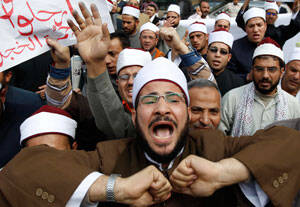Commenting on elections planned for Egypt on Nov. 28, Joannes Zakaria, the Coptic bishop of Luxor, said on Oct. 3 that Egypt’s Muslim Brotherhood and the Salafis, conservative Muslims, appeared to be the most organized political groups. But, he said, “those who want a truly democratic regime that respects the rights of all” should have a strong say in the elections. “One has to keep in mind that since 1952, from Nasser’s revolution, until today, Egypt was ruled by a military regime that did not prepare society for democracy,” Bishop Zakaria said. “The main problem in Egypt today is political ignorance, for which everything ends up having a religious connotation,” he said. “This is true both for Christians and for Muslims. We all need to mature politically.” Bishop Zakaria said, “I would not have any problems to vote for a Muslim if I considered him appropriate for the office.”
Elections in Egypt
Show Comments (
)
Comments are automatically closed two weeks after an article's initial publication. See our comments policy for more.
The latest from america
At a Mass for the Jubilee of Youth outside Rome, Pope Leo exhorted over a million young people to be "seeds of hope" and a "sign that a different world is possible."
Perhaps it is the hard-won wisdom that comes with age, but the Catholic rituals and practices I once scorned are the same rituals and practices that now usher me into God's presence, time and time again.
"Only through patient and inclusive dialogue" can "a just and lasting conflict resolution can be achieved" in the long-running conflict between Israelis and Palestinians, said the Holy See's permanent observer to the United Nations.
The ”Bad Guys” films ask, how do we determine who the “bad guys” are? And if you’re marked as “bad” from the start, can you ever make good?








